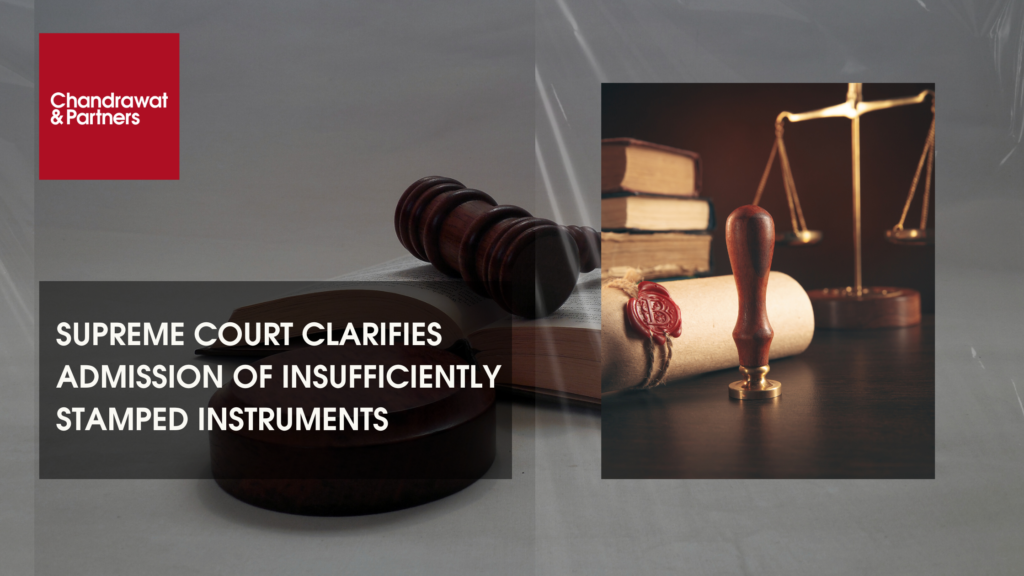Home > Recent Judgements > Supreme Court Clarifies Admission Of Insufficiently Stamped Instruments
Sept 05, 2024

SUPREME COURT CLARIFIES ADMISSION OF INSUFFICIENTLY STAMPED INSTRUMENTS
In a landmark judgment in the case of Seetharama Shetty v. Monappa Shetty, the Supreme Court, through a bench of two judges, outlined the procedural framework for admitting insufficiently stamped instruments as evidence under the Karnataka Stamp Act, 1957. This ruling clarified the roles and limitations of both the courts and the District Registrar/Deputy Commissioner in determining and collecting deficient stamp duty and penalties.
SECTION 33 : IMPOUNDING INSUFFICIENTLY STAMPED INSTRUMENTS
Section 33 of the Karnataka Stamp Act ,1957, authorizes the impounding of insufficiently or improperly stamped instruments to prevent withdrawal once inadequate stamp duty is identified. The party must either pay the requisite duty and penalty under Section 34 or apply to the District Registrar under Section 39 for determination and collection of the shortfall. Upon payment, the instrument becomes admissible as evidence.
SECTION 34: INADMISSIBILITY WITHOUT PAYMENT
Section 34 of Karnataka Stamp Act, 1957, prohibits the admission of insufficiently stamped instruments until the required duty and penalty are paid. The court must impose a penalty of ten times the deficit with no discretion. This penalty applies whether the deficiency is resolved through the court or the District Registrar under Section 39 of Karnataka Stamp Act, 1957. Failure to follow this route renders the instrument inadmissible.
SECTION 35: FINALITY OF ADMITTED INSTRUMENTS
Once an instrument is admitted into evidence under Section 34 of Karnataka Stamp Act 1957, its admissibility cannot be questioned later even by opposing parties. This provision ensures legal finality and prevents frivolous objections regarding prior insufficient stamping.
SECTION 37: HANDLING IMPOUNDED INSTRUMENTS
Under Section 37 of Karnataka Stamp Act, 1957, if a party pays the deficit duty and penalty, the court forwards the instrument to the Deputy Commissioner or District Registrar. If not covered by Section 34 or Section 36 of the act of 1957, the original document is sent to the Deputy Commissioner. Once the document is compliant with the Karnataka Stamp Act 1957, the instrument becomes admissible in evidence, removing the prior objections.
SECTION 39: REGISTRAR’S DISCRETION IN PENALTIES
Section 39 of Karnataka Stamp Act, 1957, grants the Deputy Commissioner or District Registrar the discretion to determine penalties, up to ten times the deficient duty reserved for extreme cases. The Supreme Court emphasized that this power lies exclusively with the Registrar, not the court. Thus, the trial court overstepped by imposing a ten-times penalty instead of referring the document to the Registrar.
TRIAL COURT’S ERRONEOUS IMPOSITION OF PENALTY
In this case, the appellant sought a perpetual injunction based on a sale agreement. The respondent contested the agreement’s validity, citing insufficient stamping. The trial court, adhering to Section 33 of the act of 1957 referred the agreement to the District Registrar, who assessed the deficient stamp duty at Rs. 71,200. However, the trial court erroneously imposed a ten-times penalty under Section 34 of Karnataka Stamp Act, 1957 amounting Rs. 7,83,200, without first referring the matter to the District Registrar for discretionary determination.
JUDICIAL OVERREACH AND PROCEDURAL BREACH
The Supreme Court noted that the trial court prematurely exercised its authority under Section 34 of Karnataka Stamp Act 1957, by imposing a penalty without permitting the District Registrar to determine the requisite penalty under Section 39 of Karnataka Stamp Act 1957. This action was deemed unlawful as it deprived the appellant of their statutory right to have the penalty assessed by the appropriate authority. The Supreme Court clarified that once an instrument is impounded and referred to the District Registrar, the court must await the Registrar’s determination of the duty and penalty before proceeding further.
ANNULMENT OF TRIAL COURT’S ORDER
The Supreme Court determined that the trial court’s imposition of a ten-times penalty was unlawful and violated the procedural requirements of the Karnataka Stamp Act 1957. The Court instructed the trial court to return the sale agreement to the District Registrar for a proper assessment of the deficient stamp duty and any applicable penalty under Section 39 of Karnataka Stamp Act 1957. Upon payment of the requisite duty and penalty, the appellant would then be entitled to use the agreement as admissible evidence.
INSIGHTS
This ruling underscore the distinct roles of the courts and the District Registrar in managing insufficiently stamped instruments, ensuring a clear and equitable procedure for all parties involved. The Judgement reaffirms the Supreme Court’s supervisory jurisdiction over trial courts, ensuring compliance with legal boundaries and preventing judicial overreach or procedural violations.
For more information or queries, please email us at
enquiries@chandrawatpartners.com




